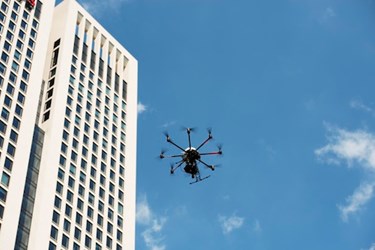Drone-Blocking Technology Helped Secure Presidential Debate

By Christine Kern, contributing writer

Las Vegas Police used sophisticated system to detect and identify potential drone threats.
While drones have great potential in a number of arenas — including retail and restaurant delivery, remote monitoring and surveillance, disaster recovery, and the delivery of healthcare services to remote locations — in the wrong hands they can also pose serious security threats. The White House has raised concerns drones can carry weapons or explosives on pre-programmed flight paths or be flown by concealed operators, in particular, and militant terrorist organizations have already deployed drones of such nature in fatal attacks overseas.
In the latest move to check unauthorized drone use, the Las Vegas Metropolitan Police Department (LVMPD) was able to deploy a sophisticated system of automated sensors and networked software from Dedrone, integrated with its own security measures, to detect and identify potential drone threats during the final presidential debate held at the Thomas & Mack Center, University of Nevada, Las Vegas (UNLV).
“Even though Las Vegas has hosted heads of state and presidents, the presidential debate coupled with the large crowd that it drew, posed a unique set of risks,” LVMPD Assistant Sheriff Tom Roberts said. “We were able to seamlessly integrate the tracker into our safety plan. Having technology that will protect us from the air and provide real-time information was a huge advantage to having a safe and uneventful evening.”
The new anti-drone security measures helped insure there were no major security threats during the debate, according to Forbes. The security network detected any potential drone threats within several hundred meters of the event arena in real-time, allowing police to take appropriate counter-measures including drone-jamming. The Dedrone system was also employed at the first presidential debate held at Hofstra University in New York, and no successful drone incursions were reported at any of this year’s events.
“Protecting the public from malicious drones is increasingly on the agenda of today’s security agencies,” said Dedrone CEO Jörg Lamprecht. “Millions of drones are sold each year. Cheaper drones are easily purchased by enthusiasts and photographers, but the technology has been used by militant groups as well. Airspace security is now as vital as security on the ground. We are very proud that our technology was selected to protect such a high-level national event, and that we were able to contribute to a successful outcome.”
